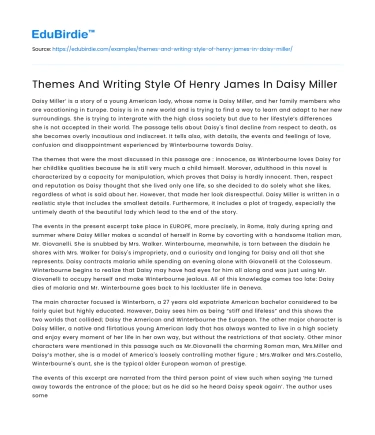Daisy Miller’ is a story of a young American lady, whose name is Daisy Miller, and her family members who are vacationing in Europe. Daisy is in a new world and is trying to find a way to learn and adapt to her new surroundings. She is trying to intergrate with the high class society but due to her lifestyle’s differences she is not accepted in their world. The passage tells about Daisy's final decline from respect to death, as she becomes overly incautious and indiscreet. It tells also, with details, the events and feelings of love, confusion and disappointment experienced by Winterbourne towards Daisy.
The themes that were the most discussed in this passage are : innocence, as Winterbourne loves Daisy for her childlike qualities because he is still very much a child himself. Morover, adulthood in this novel is characterized by a capacity for manipulation, which proves that Daisy is hardly innocent. Then, respect and reputation as Daisy thought that she lived only one life, so she decided to do solely what she likes, regardless of what is said about her. However, that made her look disrespectful. Daisy Miller is written in a realistic style that includes the smallest details. Furthermore, It includes a plot of tragedy, especially the untimely death of the beautiful lady which lead to the end of the story.
Save your time!
We can take care of your essay
- Proper editing and formatting
- Free revision, title page, and bibliography
- Flexible prices and money-back guarantee
The events in the present excerpt take place in EUROPE, more precisely, in Rome, Italy during spring and summer where Daisy Miller makes a scandal of herself in Rome by cavorting with a handsome Italian man, Mr. Giovanelli. She is snubbed by Mrs. Walker. Winterbourne, meanwhile, is torn between the disdain he shares with Mrs. Walker for Daisy's impropriety, and a curiosity and longing for Daisy and all that she represents. Daisy contracts malaria while spending an evening alone with Giovanelli at the Colosseum. Winterbourne begins to realize that Daisy may have had eyes for him all along and was just using Mr. Giovanelli to occupy herself and make Winterbourne jealous. All of this knowledge comes too late: Daisy dies of malaria and Mr. Winterbourne goes back to his lackluster life in Geneva.
The main character focused is Winterborn, a 27 years old expatriate American bachelor considered to be fairly quiet but highly educated. However, Daisy sees him as being “stiff and lifeless” and this shows the two worlds that collided; Daisy the American and Winterbourne the European. The other major character is Daisy Miller, a native and flirtatious young American lady that has always wanted to live in a high society and enjoy every moment of her life in her own way, but without the restrictions of that society. Other minor characters were mentioned in this passage such as Mr.Giovanelli the charming Roman man, Mrs.Miller and Daisy’s mother, she is a model of America's loosely controlling mother figure ; Mrs.Walker and Mrs.Costello, Winterbourne's aunt, she is the typical older European woman of prestige.
The events of this excerpt are narrated from the third person point of view such when saying ‘He turned away towards the entrance of the place; but as he did so he heard Daisy speak again’. The author uses some figures of speach to make his story attractive and vivid. Example of these include : metaphor ‘they don’t really care a straw what I do’ as a description of whether or not they are interested in what Daisy does. A simile 'I have noticed you. But I noticed you were as stiff as an umbrella the first time I saw you.' As he compare Winterbourne’s rigidity and straightness to an umbrella. At last, one can easily notice Henry’s talent in the art of writing. Indeed, his writing is influential and exhorts the reader to follow the flow of the events due to suspense created within the story as a whole. One this basis, one can come up to the conclusion that Daisy's innocence triumphs and the lasting message of the novella is Daisy's innocence and the cruelty of the society which condemned her to death.






 Stuck on your essay?
Stuck on your essay?

